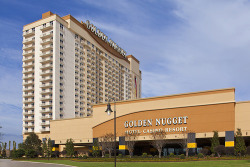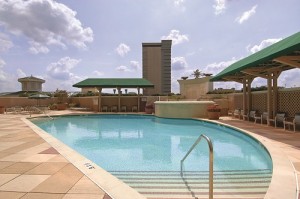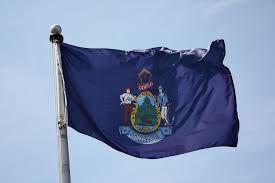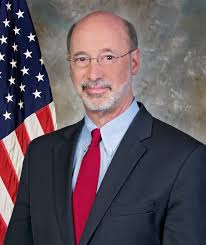Louisiana gaming revenues, aided by Leap Day, were flat last month, which is pretty surprising because most of the brand names had revenue-negative months. Lake Charles  led the state with $74 million. Golden Nugget had a signal month, up 37% for a $19 million gross. Despite a 2% decline, L’Auberge du Lac continued to dominate the market — and lead the state — with $27 million, while Boyd Gaming‘s Delta Downs receded 4% to $16 million. Isle Grand Palais was flat, with a $12 million gross. Boyd’s outlying properties also fared poorly, with Amelia Belle ($4 million) down 8% and Evangeline Downs retreating 9% ($9 million gross). Despite a 5% decline, L’Auberge Baton Rouge keeps crushing the competition, grossing $14 million. Gaming & Leisure Properties‘ Hollywood Baton Rouge was a distant second, with $6 million (-9.5%), while Tropicana Entertainment‘s Belle of Baton Rouge slipped 4%, to $5 million.
led the state with $74 million. Golden Nugget had a signal month, up 37% for a $19 million gross. Despite a 2% decline, L’Auberge du Lac continued to dominate the market — and lead the state — with $27 million, while Boyd Gaming‘s Delta Downs receded 4% to $16 million. Isle Grand Palais was flat, with a $12 million gross. Boyd’s outlying properties also fared poorly, with Amelia Belle ($4 million) down 8% and Evangeline Downs retreating 9% ($9 million gross). Despite a 5% decline, L’Auberge Baton Rouge keeps crushing the competition, grossing $14 million. Gaming & Leisure Properties‘ Hollywood Baton Rouge was a distant second, with $6 million (-9.5%), while Tropicana Entertainment‘s Belle of Baton Rouge slipped 4%, to $5 million.
It’s virtually impossible to tell whether the New Orleans smoking is actually hurting Harrah’s New Orleans or not. Last month it was only down 3%, to $26 million. Churchill Downs‘ racino (-9.5%) was pained more, with only a $4 million gross. Neither Boyd’s Treasure Chest riverboat ($9 million, -1%) nor Pinnacle Entertainment‘s Boomtown New Orleans ($10  million, -4.5%) benefited from any smokers seeking refuge, it would appear. In the crowded Shreveport/Bossier City market, Horseshoe Bossier City (-2%) led the pack with a $16 million gross. Caesars Entertainment‘s Louisiana Downs posted a 5% gain, to $4 million. Also gaining ground on their rivals were Margaritaville (+12%, $13 million) and Eldorado Resorts‘ eponymous Shreveport casino ($12.5 million, +2%). Those suffering from the competition included Sam’s Town Shreveport (above, $8 million, -8%) and Diamond Jacks, which fell 12%, to $4.5 million. While customers in the Upper Midwest are spending more freely at the casino these days, those in the Deep South appear to be tightening their purse strings.
million, -4.5%) benefited from any smokers seeking refuge, it would appear. In the crowded Shreveport/Bossier City market, Horseshoe Bossier City (-2%) led the pack with a $16 million gross. Caesars Entertainment‘s Louisiana Downs posted a 5% gain, to $4 million. Also gaining ground on their rivals were Margaritaville (+12%, $13 million) and Eldorado Resorts‘ eponymous Shreveport casino ($12.5 million, +2%). Those suffering from the competition included Sam’s Town Shreveport (above, $8 million, -8%) and Diamond Jacks, which fell 12%, to $4.5 million. While customers in the Upper Midwest are spending more freely at the casino these days, those in the Deep South appear to be tightening their purse strings.
* West Virginia solons came close, but ultimately balked, at legislation that would have effectively phased out greyhound racing in their state. One bill would have not only decoupled racing from casino licenses but ended state subsidies to racing purses. Over in the state House, a bill would cut off the subsidies but still force casinos to run races to keep their licenses, putting the burden of fattening the purses on the racinos. While the removal of subsidies would make it very difficult to sustain dog racing (no bad thing), Wheeling Island Hotel-Casino-Racetrack General Manager Osi Imomoh found the House bill more onerous: “If you take away the purse funds, you’re naturally going to kill the industry … If you take away the purse funds and don’t decouple, you’re putting the whole [casino] at risk.” (Horseracing backers fear that their state subsidies will be next on the chopping block.) Casinos are also faced with the elimination of $1.9 million in rebates that they receive in order to make capex reinvestments in their facilities. “That is what we basically use to help us with improving our floors. It’s a fund that we pay into. It’s not a subsidy,” Imomoh told The Intelligencer, Wheeling News-Register.
* Hiding behind the skirts of his sister Lisa, casino speculator Shawn Scott is going to appeal the invalidation of his Maine ballot question to give him a York County casino. Secretary of State Matt Dunlap disqualified over 55,000 signatures. Since Scott is involved, this comes as no surprise: “Since then, election clerks in three Idaho counties  have found evidence of forged signatures, authorities said. Names appeared to have been copied from voter registration rolls in one county and directly from the telephone book in another.” No irregularities so blatant have emerged in Maine, but Scott’s dodgy past — including the denial of a New York State gaming license — gives one no great confidence in his latest effort, especially when his petition gatherer, Stavros Mendros, pled guilty to petition irregularities in 2007. Among Scott’s various complaints against Dunlap is that petitions weren’t invalidated one by one but in batches, based on the validity of small notarized samples. “It was clear just by looking at the documents that somebody had a stack of petitions and somebody was just notarizing them,” said Dunlap. Mendros is also in hot water after his Campaign to Regulate Marijuana Like Alcohol had 26,779 signatures tossed. Scott and Mendros would appear to be birds of a feather.
have found evidence of forged signatures, authorities said. Names appeared to have been copied from voter registration rolls in one county and directly from the telephone book in another.” No irregularities so blatant have emerged in Maine, but Scott’s dodgy past — including the denial of a New York State gaming license — gives one no great confidence in his latest effort, especially when his petition gatherer, Stavros Mendros, pled guilty to petition irregularities in 2007. Among Scott’s various complaints against Dunlap is that petitions weren’t invalidated one by one but in batches, based on the validity of small notarized samples. “It was clear just by looking at the documents that somebody had a stack of petitions and somebody was just notarizing them,” said Dunlap. Mendros is also in hot water after his Campaign to Regulate Marijuana Like Alcohol had 26,779 signatures tossed. Scott and Mendros would appear to be birds of a feather.
* If you gamble in Pennsylvania, enjoy your free-play coupons while they last: Gov. Tom Wolf (D, right) wants to impose an 8% tax on free-play promotions. As columnist Tom  Gruetze points out, Wolf isn’t seeking to tax Kohl’s Cash or frequent-diner programs: “Wolf’s plan and a similar one in Ohio illustrate how political leaders often treat casinos differently from other businesses simply because people go to casinos to, you know, gamble. In some peoples’ eyes, playing slots, blackjack and roulette isn’t as wholesome as, say, buying lottery tickets.” For example, Rivers Casino pays more for Consol Energy Center than do the Pittsburgh Penguins, who actually use it. In keeping with the company’s reputation, Penn National Gaming‘s eponymous racino had the tightest slots in the state, paying out only 89%, while Parx Casino had the loosest, returning 91%.
Gruetze points out, Wolf isn’t seeking to tax Kohl’s Cash or frequent-diner programs: “Wolf’s plan and a similar one in Ohio illustrate how political leaders often treat casinos differently from other businesses simply because people go to casinos to, you know, gamble. In some peoples’ eyes, playing slots, blackjack and roulette isn’t as wholesome as, say, buying lottery tickets.” For example, Rivers Casino pays more for Consol Energy Center than do the Pittsburgh Penguins, who actually use it. In keeping with the company’s reputation, Penn National Gaming‘s eponymous racino had the tightest slots in the state, paying out only 89%, while Parx Casino had the loosest, returning 91%.

